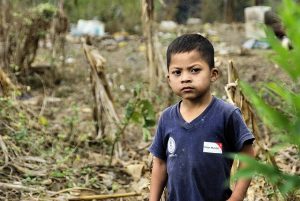This post was contributed by Dr Silvia Posocco of Birkbeck’s Department of Psychosocial Studies.
December 2016 will mark the twentieth anniversary of the signing of the Guatemalan Peace Accords that ended thirty-six years of conflict. The roots of the Guatemalan conflict lie in a history of colonial conquest and US imperialism. In 1954, a CIA-sponsored coup d’état overthrew the democratically elected government of President Jacobo Árbenz Guzmán. The coup sought to shore up US economic interests and specifically protect the operations of the United Fruit Company – a corporation trading in bananas and other tropical fruit. During this 36-year-long conflict, a succession of US-sponsored Guatemalan governments waged a structural assault against indigenous Maya communities, the poor, and those associated with left-wing and social justice activism, and armed struggle. From the mid-twentieth century, these individuals, groups, and communities with historical experiences of violent exploitation, racist domination, and dispossession were progressively marked as subversive and deemed to be ‘internal enemies of the state’ within the counterinsurgency logics of anticommunism and Cold War geopolitics.
 Children were engulfed in the violence that swept over the country. One in every five persons killed by ‘ejecución arbitraria,’ or ‘arbitrary execution,’ during the conflict was a child. One in every 10 persons forcefully disappeared was a child. Not all forcefully disappeared children were killed; rather, many were internally displaced. Some were institutionalized and eventually adopted transnationally. Among those who were internally displaced and those who crossed the Guatemala–Mexican border as refugees during the conflict, children made up the majority of those who died. The conflict left over 200,000 people dead, the majority Maya, and the United Nations-sponsored Commission for Historical Clarification concluded that ‘agents of the State of Guatemala, within the framework of counterinsurgency operations carried out between 1981 and 1983, committed acts of genocide against groups of Maya people’ in four specific regions of the country (Maya-Q’anjob’al and Maya-Chuj in Barillas; Nenton and San Mateo Ixtatán in North Huehuetenango; Maya-lxiI in Nebaj, Cotzal, and Chajul, Quiché; Maya-Kiche’ in Joyabaj, Zacualpa, and Chiche, Quiché; and Maya-Achi in Rabinal, Baja Verapaz).
Children were engulfed in the violence that swept over the country. One in every five persons killed by ‘ejecución arbitraria,’ or ‘arbitrary execution,’ during the conflict was a child. One in every 10 persons forcefully disappeared was a child. Not all forcefully disappeared children were killed; rather, many were internally displaced. Some were institutionalized and eventually adopted transnationally. Among those who were internally displaced and those who crossed the Guatemala–Mexican border as refugees during the conflict, children made up the majority of those who died. The conflict left over 200,000 people dead, the majority Maya, and the United Nations-sponsored Commission for Historical Clarification concluded that ‘agents of the State of Guatemala, within the framework of counterinsurgency operations carried out between 1981 and 1983, committed acts of genocide against groups of Maya people’ in four specific regions of the country (Maya-Q’anjob’al and Maya-Chuj in Barillas; Nenton and San Mateo Ixtatán in North Huehuetenango; Maya-lxiI in Nebaj, Cotzal, and Chajul, Quiché; Maya-Kiche’ in Joyabaj, Zacualpa, and Chiche, Quiché; and Maya-Achi in Rabinal, Baja Verapaz).
I have conducted research in Guatemala as an anthropologist since 1999, where I first worked with ex-combatants of one of the four guerrilla groups operating in the country up to December 1996 – the Rebel Armed Forces, who were part of the umbrella organization Guatemalan National Revolutionary Unity. Since 2009, I have been researching transnational adoption circuits and the movements of Guatemalan adoptees to the Global North. I have found transnational adoption networks to be intertwined with the history of political violence and the multiple dynamics of structural and military assaults against Maya communities. At the ‘Genocide and Resistance in Guatemala’* conference in September, I will be presenting a paper focussing on the case of a group of Maya children forcefully removed from their families and communities in the region of Alta Verapaz in 1983. The case helps us to understand the nexus between transnational adoption and genocide.
The conference will be a remarkable event that will bring together scholars whose work has been immensely influential in drawing public attention to events in Guatemala. Their work with individuals and communities over time has also shaped and sustained an agenda for a politically and ethically committed anthropology.
*In September 2016, the Shoah Foundation Center for Advanced Genocide Research, University of Southern California, Los Angeles, in collaboration with the USC Latino Alumni Association and the USC School of International Relations, will host the international conference ‘Genocide and Resistance in Guatemala’. The conference is organised by, Professor Victoria Sanford (Lehman College, CUNY) and Professor Wolf Gruner (USC).
Further reading:
- Stephen Schlesinger and Stephen Kinzer (2005) Bitter Fruit: The Story of the American Coup in Guatemala, Revised Edition, New York: David Rockefeller Center for Latin American Studies
- CEH (Comisión de Esclarecimiento Histórico)/United Nation Commission for Historical Clarification (1999) Guatemala: Memory of Silence, Tz’inil Na’tab’al, Guatemala City: United Nations.
- ODHAG (Oficina de Derechos Humanos del Arzobispado de Guatemala) (1999) Guatemala: Never Again!, Guatemala: ODHAG.
- ODHAG (2006) Hasta Encontrarte: Niñez Desaparecida por el Conflicto Armado Interno en Guatemala, Guatemala: ODHAG.
- Posocco, Silvia (2011) ‘Expedientes: Fissured Legality and Affective States in the Transnational Adoption Archives in Guatemala’, Journal of Law, Culture and Humanities, 7, 434–456.
- Posocco, Silvia (2014) Secrecy and Insurgency: Socialities and Knowledge Practices in Guatemala, Tuscaloosa: Alabama University Press.
